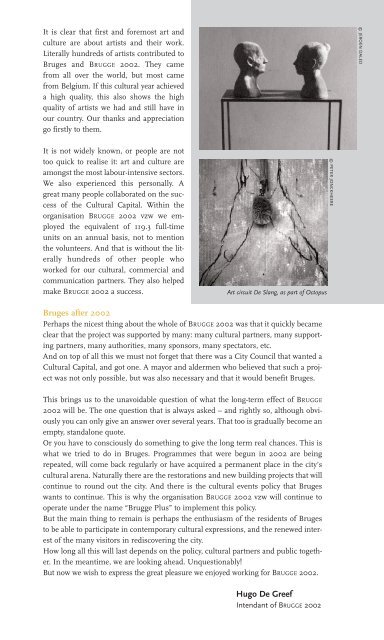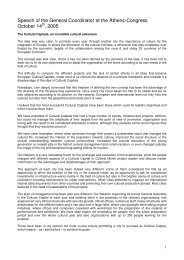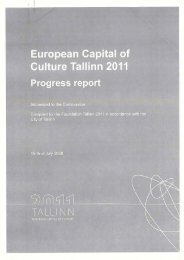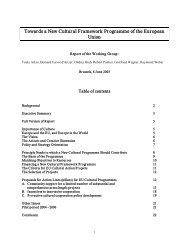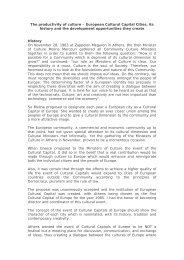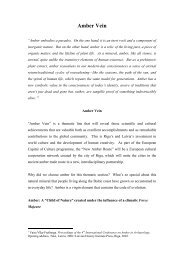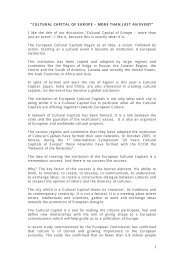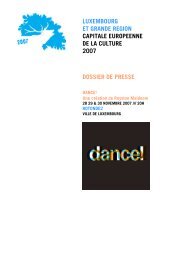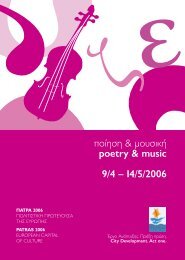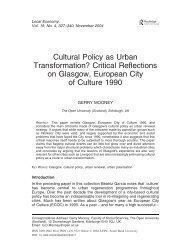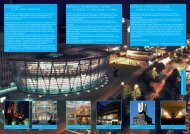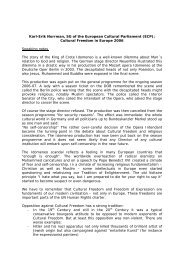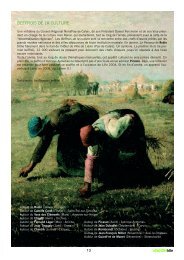Concise.pdf - Brugge Plus
Concise.pdf - Brugge Plus
Concise.pdf - Brugge Plus
- No tags were found...
Create successful ePaper yourself
Turn your PDF publications into a flip-book with our unique Google optimized e-Paper software.
It is clear that first and foremost art and<br />
culture are about artists and their work.<br />
Literally hundreds of artists contributed to<br />
Bruges and BRUGGE 2002. They came<br />
from all over the world, but most came<br />
from Belgium. If this cultural year achieved<br />
a high quality, this also shows the high<br />
quality of artists we had and still have in<br />
our country. Our thanks and appreciation<br />
go firstly to them.<br />
© JEROEN DALED<br />
It is not widely known, or people are not<br />
too quick to realise it: art and culture are<br />
amongst the most labour-intensive sectors.<br />
We also experienced this personally. A<br />
great many people collaborated on the success<br />
of the Cultural Capital. Within the<br />
organisation BRUGGE 2002 vzw we employed<br />
the equivalent of 119.3 full-time<br />
units on an annual basis, not to mention<br />
the volunteers. And that is without the literally<br />
hundreds of other people who<br />
worked for our cultural, commercial and<br />
communication partners. They also helped<br />
make BRUGGE 2002 a success.<br />
Art circuit De Slang, as part of Octopus<br />
© PETER JONCKHEERE<br />
Bruges after 2002<br />
Perhaps the nicest thing about the whole of BRUGGE 2002 was that it quickly became<br />
clear that the project was supported by many: many cultural partners, many supporting<br />
partners, many authorities, many sponsors, many spectators, etc.<br />
And on top of all this we must not forget that there was a City Council that wanted a<br />
Cultural Capital, and got one. A mayor and aldermen who believed that such a project<br />
was not only possible, but was also necessary and that it would benefit Bruges.<br />
This brings us to the unavoidable question of what the long-term effect of BRUGGE<br />
2002 will be. The one question that is always asked – and rightly so, although obviously<br />
you can only give an answer over several years. That too is gradually become an<br />
empty, standalone quote.<br />
Or you have to consciously do something to give the long term real chances. This is<br />
what we tried to do in Bruges. Programmes that were begun in 2002 are being<br />
repeated, will come back regularly or have acquired a permanent place in the city’s<br />
cultural arena. Naturally there are the restorations and new building projects that will<br />
continue to round out the city. And there is the cultural events policy that Bruges<br />
wants to continue. This is why the organisation BRUGGE 2002 vzw will continue to<br />
operate under the name “<strong>Brugge</strong> <strong>Plus</strong>” to implement this policy.<br />
But the main thing to remain is perhaps the enthusiasm of the residents of Bruges<br />
to be able to participate in contemporary cultural expressions, and the renewed interest<br />
of the many visitors in rediscovering the city.<br />
How long all this will last depends on the policy, cultural partners and public together.<br />
In the meantime, we are looking ahead. Unquestionably!<br />
But now we wish to express the great pleasure we enjoyed working for BRUGGE 2002.<br />
Hugo De Greef<br />
Intendant of BRUGGE 2002


